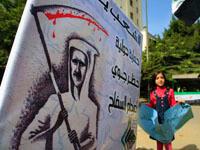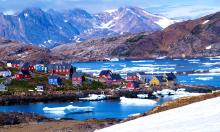Syrian opposition consists of Islamists
 Syrian National Council (SNS), positioning itself as the main force of the Syrian opposition, called on the League of Arab States (LAS) to recognize it as a legitimate representative of the Syrian people. A member of the SNS Jaber Al-Shufi expects that by doing so LAS would automatically suspend Syria's membership in this organization. In addition, it will help isolate the Assad regime on the world arena.
Syrian National Council (SNS), positioning itself as the main force of the Syrian opposition, called on the League of Arab States (LAS) to recognize it as a legitimate representative of the Syrian people. A member of the SNS Jaber Al-Shufi expects that by doing so LAS would automatically suspend Syria's membership in this organization. In addition, it will help isolate the Assad regime on the world arena.
Some Western countries are ready to recognize the SNS. French Foreign Minister Alain Juppe made a statement that Paris can do it in case it would be beneficial to the Council itself (SNS).
However, it is worth mentioning that there are other groups of Syrian opposition that do not recognize the SNS. The question arises: what are the opponents of the current regime in Syria like? A representative of the Committee of National Unity of Syria in Russia Osama Matar answered this and other questions in the interview for "Pravda.Ru":
"The so-called National Council that meets in Istanbul is so popular among the Syrians only in his words. In fact, it represents only itself and for the most part its members are people engaged by the Western circles at best. Among its members are people associated with western intelligence agencies who in some way direct their actions.
I would note that in Syria there is another opposition that does not recognize the immigrants that settled in Turkey and that acts on Syrian territory. In particular, the Steering Committee of Syria, which consists of a series of center-left parties that has ten times more supporters than the SNS.
"Are there any charismatic personalities among the opposition who could really challenge Bashar Assad?"
"There are no such individuals. If you take Ghalioun who formally is the head of the SNS, he was appointed by the West only to divert attention and create an illusion of representation of the organization composed primarily of the representatives of the "Muslim Brotherhood". Ghalioun is a professor of humanities who taught for many years in France and presented himself as a Democrat. However, according to many reviews, there is not much science in his work but enough bias. His promotion actively began five years ago at the Qatari television station "Al Jazeera". The articles written by this man were not particularly significant as would be expected from a professor at the Sorbonne, and, above all, they declared the mythical "Iranian threat." You can call Mr. Ghalioun the opposition with great difficulty. After all, he had not opposed the regime before and avoided repressions. It is no accident that his name as well as the names of most members of the NSS says little to the Syrians.
The leaders of the center-left National Democratic Coordinating Authority of Syria are increasingly more popular, especially Michel Kilo and even more so, Hassan Abdulazim. The latter is the oldest secular-leaning opposition, who, in contrast to Ghalioun, is not fighting the authorities from Paris and Istanbul stands but has a real fight for which he has repeatedly suffered from the regime. Yet, they do not have enough charisma to become the national leaders."
"Nevertheless, judging by the news coming from different Syrian cities, Bashar Assad is not supported by all Syrians?"
"Unfortunately, it looks like Bashar al-Assad does not possess full control over the situation. One of the main problems is that the announced reforms have not yet begun.
In fact, there is no concept of the reforms. The beginning of modernization is presented as adoption of certain laws that do not change anything. I think that the draft law on elections is disgusting. As a result, they will not let anyone in office in general and the Parliament in particular. The regime is torn: one minute it is ready to hold elections, next it recalls the need to replace the Constitution. But in reality, since May of this year, the existing Parliament has been illegitimate. It cannot adopt or repeal anything because its legitimate power has expired, and new composition must be elected.
The other issue of concern not only for the opposition but also for ordinary Syrians is the provisions of the role of the army and security forces in the country. On the other hand, the regime demonstrates its weakness when the Syrian Foreign Ministry publicly begins to make excuses for purely internal affairs.
All these gaps and weaknesses in the regime are used by the opposition to strengthen its criticism. One of the main reasons for delay in the modernization of the country is the interference of the influential groups close to the authorities. Among the main ones are special services. It is their leadership that prefers to keep the power in the form it was prior to the events, and it prefers to solve the problem by force.
"Do you agree with the opinion of the opponents of Bashar al-Assad that the blood of over three thousand victims of the "Arab Spring" in Syria is to blame on the current regime?"
"Such statements are false. Both sides are to blame for the deaths. But I will say that the representatives of the regime were largely provoked by retaliatory action of those who thrown on a democratic toga of the "fighters against the tyranny." Take "liberal" Ghalioun who tirelessly claims that he would lead Syria to democracy. And what happened? Suddenly he openly acknowledges support of the organization "Free the Syrian Army," whose militants pose in the ads of NSS with characteristic stripes and weapons in their hands. Are these toy machine guns and grenade launchers?
And if some of the radical opposition did not organize the attacks, there would have not been that much blood. It is quite clear who funds these militants and whose orders they fulfill. Think back to late October when the Syrian Foreign Ministry stated the recognition of requirements of the Arab League and announced the release of hundreds of opposition members. The next day, the U.S. State Department openly declared that the armed opposition should not lay down their arms."
"What role does "Muslim Brotherhood" play in the events?"
"A very significant one. Although this is not the largest opposition group, it is dangerous because it is the best organized and the wealthiest one."
"It seems, judging by the actions of leaders such as Arur, that even the radical opposition is not united and that its different representatives have different masters?"
"Sheikh Arur representing Salafi groups limited in number is a protégé of several Gulf countries including Saudi Arabia. However, the actions of the radical opposition are completely identical in their primary goals - the overthrow of the regime. In this respect its actions are agreeable with the plans of the Western intelligence agencies."
Sergei Balmasov
Pravda.Ru
Subscribe to Pravda.Ru Telegram channel, Facebook, RSS!




